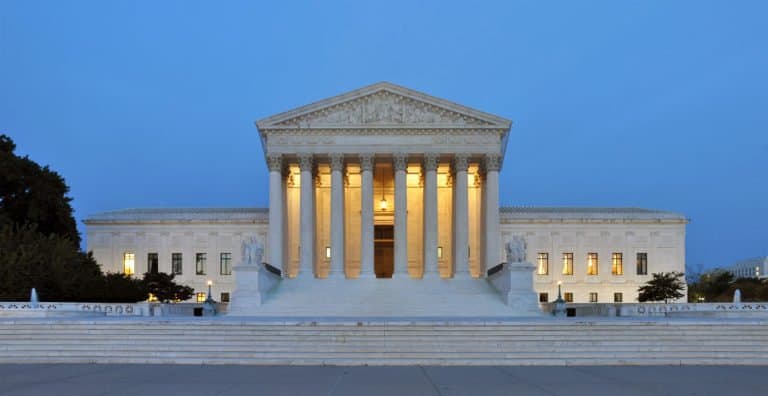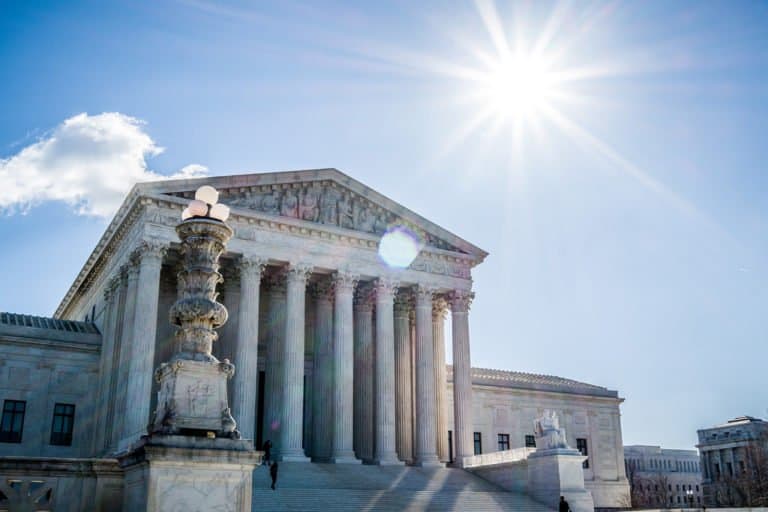
Andrew Strom is a union lawyer based in New York City. He is also an adjunct professor at Brooklyn Law School.
It shouldn’t have come as a surprise to anyone that when faced with a choice between originalism and right-wing ideology, the Supreme Court’s two avowed originalists, Justices Gorsuch and Thomas, decided that they weren’t going to let doctrinal purity get in the way of their desired result. It’s worth taking a close look at how easily Justices Gorsuch and Thomas tossed originalism aside in Janus, since President Trump’s nominee to replace Justice Kennedy will almost certainly proclaim similar fealty to the text of the Constitution as originally understood.
To me, the split within the right-wing of the Court is best summed up by an exchange in an oral argument in a case involving California’s attempt to ban the sale of violent video games to anyone under 18. After Justice Scalia asked a question, Justice Alito chimed in, “I think what Justice Scalia wants to know is what James Madison thought about video games. Did he enjoy them?” Justice Alito has never had much patience for originalism, and so it was not surprising that he was so dismissive of originalist arguments in his Janus opinion. But, Justice Thomas has built his entire reputation on his supposed adherence to originalism. In a 2016 celebration of Justice Thomas’s 25 years on the Court in National Review, Josh Blackman wrote, “Justice Clarence Thomas’s quarter century on the Supreme Court has been defined by a principled devotion to understanding the Constitution’s original meaning and applying it to modern-day cases.” In his short tenure on the Court, Justice Gorsuch has already joined a concurrence by Justice Thomas calling for the Court to reconsider its Fourth Amendment jurisprudence in light of the “original meaning” of that provision. But Janus made clear that Justices Thomas and Gorsuch are not quite as principled in their adherence to originalism as their admirers would have us believe.
In Janus, the Union’s brief pointed out that the framers did not recognize free speech rights for public employees. AFSCME argued that this principle was so well-settled that no challenge to a restriction on government employee speech reached the Court until 1882. Moreover, as late as 1952, the Court explained that individuals “have no right to work for the State in the school system on their own terms,” and if they don’t like the terms imposed by the State “they are at liberty to retain their beliefs and associations and go elsewhere. Has the State thus deprived them of any right to free speech or assembly? We think not.” Or to put it another way, in 1892, Justice Holmes wrote that a policeman “may have a constitutional right to talk politics, but he has no constitutional right to be a policeman.”
In response, the five Justices in the majority dismissed this history on the grounds that the “Union offers no persuasive founding-era evidence that public employees were understood to lack free speech protections.” Compare the approach Justice Thomas took in Janus to the approach he took in Morse v. Frederick, a case involving the First Amendment rights of high school students. In Morse, Justice Thomas apparently conducted his own research into the history of public education to reach the conclusion that the Constitution offers no protection to public school students. Rather than relying upon “founding-era evidence,” he instead looked to court decisions from the late nineteenth and earlier twentieth centuries to bolster his case. In Janus, the Court majority dismissed cases cited by AFSCME as “at most show[ing] that the government was understood to have power to limit employee speech that threatened important government interests.” Yet, in Morse, Justice Thomas similarly cited to cases upholding restrictions on student speech where courts justified those restrictions as “necessary to the orderly conduct of the schools.” Justice Thomas was not able to find any case expressly holding that public school students shed all their constitutional rights at the schoolhouse door.
In rejecting AFSCME’s originalist argument, the Court majority questioned the Union’s sincerity. The Justices expressed “doubt that the Union – or its members – actually want us to hold that public employees have no free speech rights.” Of course, the Union doesn’t want that. But, why should that be relevant to the Court’s analysis? After all, isn’t the Constitution supposed to have a fixed meaning, not one that varies depending upon the identity and interests of the parties in a particular case. Yes, it would obviously be a terrible result if the Court were to undo 50 years of progress for public employees to hold that they have no First Amendment rights. But, it was no less terrible for Justice Thomas to argue in Morse for overturning 50 years of settled case law establishing that school children have First Amendment rights.
It’s easy for Justices to say that they are simply following the intent of the framers when that leads them to their preferred policy outcome. But the Janus decision is powerful evidence that “originalism” may be little more than a means to justify an end, and when it is inconvenient, it will be quickly discarded so that right-wing Justices can find another way to reach their preferred outcome.








Daily News & Commentary
Start your day with our roundup of the latest labor developments. See all
January 9
TPS cancellation litigation updates; NFL appeals Second Circuit decision to SCOTUS; EEOC wins retaliation claim; Mamdani taps seasoned worker advocates to join him.
January 8
Pittsburg Post-Gazette announces closure in response to labor dispute, Texas AFT sues the state on First Amendment grounds, Baltimore approves its first project labor agreement, and the Board formally regains a quorum.
January 7
Wilcox requests en banc review at DC Circuit; 9th Circuit rules that ministry can consider sexual orientation in hiring decisions
January 5
Minor league hockey players strike and win new deal; Hochul endorses no tax on tips; Trump administration drops appeal concerning layoffs.
December 22
Worker-friendly legislation enacted in New York; UW Professor wins free speech case; Trucking company ordered to pay $23 million to Teamsters.
December 21
Argentine unions march against labor law reform; WNBA players vote to authorize a strike; and the NLRB prepares to clear its backlog.